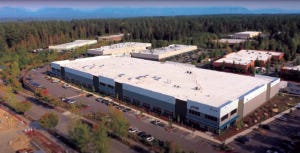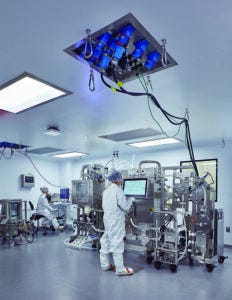- Sponsored Content
- Continuous Bioprocessing
- Facility Design/Engineering
- Contract Services
Biologics Manufacturing Without the Big BioreactorsBiologics Manufacturing Without the Big Bioreactors
June 21, 2022
Sponsored by Just - Evotech Biologics
 Over the past few decades, the biotechnology industry has brought to patients a medical revolution with the most advanced medicine ever seen. Yet much of the world’s population cannot afford or get access to these breakthrough therapeutics. That is in part a consequence of the high associated costs of development and biomanufacturing, extended times for regulatory review and approval, and a lack of regional manufacturing and dependable supply chains (because of facility costs and a scarcity of expertise).
Over the past few decades, the biotechnology industry has brought to patients a medical revolution with the most advanced medicine ever seen. Yet much of the world’s population cannot afford or get access to these breakthrough therapeutics. That is in part a consequence of the high associated costs of development and biomanufacturing, extended times for regulatory review and approval, and a lack of regional manufacturing and dependable supply chains (because of facility costs and a scarcity of expertise).
The recent unprecedented success in developing and delivering into the arms of patients a collection of safe and efficacious vaccines and treatments against COVID-19 was made possible through relentless effort and collaboration among all industry stakeholders: drug developers and manufacturers, regulators, governments, vendors, suppliers, and global health partners. However, access to those life-saving treatments has been slow or unattainable for many geographies with vulnerabilities in their supply chains and constrained, limited, or nonexistent biomanufacturing capacity.
The industry has learned that it needs more nimble, scalable biologics manufacturing solutions to better prepare us for the next pandemic while maintaining capacity for other important therapeutics. This is especially the case as momentum picks up once again and as successful biological therapies are entering the market more frequently.
Also in recent years, the biologics industry has become more versatile and has expanded from a familiar “vanilla” monoclonal antibody (MAb) pipeline to include more challenging formats such as bispecific antibodies, fusion proteins, or exosomes. Next-generation therapies are complex to develop and manufacture, further driving the need for advanced technologies and approaches to ensure productivity and quality while preserving the cost-efficiency of commercial biomanufacturing.
Biomanufacturing Facility Trends
With the emergence of new product formats, our industry also is moving away from huge blockbuster drugs and toward smaller market sizes, personalized medicines, and combination therapies. The commercial volume requirements thus are shifting from metric-ton quantities to a few hundred kilograms for most biologics. Therefore, the need to operate a bioprocess in multiple 15,000-L stainless-steel bioreactors and build dedicated commercial facilities is decreasing while the demand for smaller and more flexible manufacturing plants is emerging.
Historically, the biopharmaceutical industry has used large-scale facilities successfully for reliable production and supply of biologics. Those conventional facilities have required substantial fixed assets, and each facility tended to be constructed for producing a single drug, making it relatively inflexible to modification for new products. Such classic sites typically featured six-packs or nine-packs of stainless-steel bioreactors up to 15 kL in scale, all supported by centralized utilities such as clean-in-place (CIP) and steam-in-place (SIP) systems and requiring miles of complex process piping. Such facilities cost at least US$500 million to construct, required three to five years to build and qualify, and occupied large footprints averaging about 800,000 ft2.
Over the past decade, however, the industry has increasingly adopted disposable technologies, explored modular plant layouts, and considered equipment automation and process productivity improvements. That slow but steady move toward intensified and continuous processing has progressed in parallel with economic and environmental sustainability priorities.
A Strategy for Flexibility
At Just–Evotec Biologics, we are addressing those industry trends with our next-generation J.POD flexible facilities. Our relatively low-cost, flexible, and deployable manufacturing approach is based on a simple plant design in which grade B and grade C autonomous cleanrooms (PODs) are placed within a grade D “ballroom” environment. Processes are intensified, automated, and used in fully or semicontinuous mode to produce large quantities of drug substance within a relatively small space. Single-use systems are leveraged fully to eliminate the need for CIP and SIP systems. This paradigm shifts complexity from the overall plant to each individual process. Our advanced continuous-manufacturing platform improves product quality through increased microbial control, reduced risk of cross-contamination, and concurrent production of multiple biologics within the same site. The facility design and processes used for biomanufacturing are optimized fully for high efficiency and flexibility. That reduces the overall plant footprint, environmental impact, and construction time and cost.
A J.POD facility is an economical, small-footprint, deployable CGMP biologics drug-substance manufacturing plant that can be built rapidly almost anywhere in the world. Each such facility is configured to produce early development to commercial-scale quantities of biological products in support of multiregional clinical programs and global commercial markets. The facility and manufacturing platform can produce bulk drug substance for a range of recombinant proteins (primarily MAbs, bispecifics, Fc-fusion proteins, nanobodies, and exosomes) using mammalian cell culture processes.
Continuous processing allows for delivery of high-mass output within a small footprint. J.POD facilities accommodate perfusion, intensified fed-batch, semicontinuous, and end-to-end continuous manufacturing processes at a standard 500-L scale to deliver a few kilograms for “first-in human” studies to metric tons of drug substance for large-market commercial supply.
For example, a semicontinuous process is perfectly suited for first-in-human products that require small quantities of material (a few kilograms) provided rapidly. An end-to-end continuous process will be used for products reaching commercial stage and requiring low cost of goods manufactured (CoGM). That type of process becomes critical for high–mass-demand products such as biosimilars or biologics that target certain oncology indications or infectious diseases. For example, the demand for MAb drug substances can be measured in metric tons.
Evolving for the Future
In August 2021, Just–Evotec Biologics opened its first J.POD facility in Redmond, WA. From the moment of shell-and-core possession to the start of engineering runs, the rapid build and facility fit-out were achieved in 16 months during the COVID pandemic. In March 2022, the Just–Evotec team completed its first GMP run of a MAb product for the US Department of Defense.
 A European replica of that facility will be built in Toulouse, France, with planned groundbreaking in the fourth quarter of 2022. The company strategy is to build a global network of deployable J.POD manufacturing facilities that can enable regional manufacturing and support the clinical and commercial supply needs of partners, including those among virtual biotechnology companies, large biopharmaceutical companies, and governmental agencies.
A European replica of that facility will be built in Toulouse, France, with planned groundbreaking in the fourth quarter of 2022. The company strategy is to build a global network of deployable J.POD manufacturing facilities that can enable regional manufacturing and support the clinical and commercial supply needs of partners, including those among virtual biotechnology companies, large biopharmaceutical companies, and governmental agencies.
Just–Evotec Biologics is an atypical contract development and manufacturing organization (CDMO) leading the way to continuous biomanufacturing while leveraging artificial intelligence and machine learning to discover and bring more “developable”/“manufacturable” molecules to the clinic. By combining revolutionary discovery and molecular- design technologies with cutting-edge intensified manufacturing capabilities, Just–Evotec Biologics is derisking the path to market and pursuing a mission to provide global access for better and more affordable biologics.
The biomanufacturing industry has been characterized by constant change and evolution since its inception in the 1980s. The first bioprocesses generated only nominal amounts of product. However, sustained process development has led to adoption of continuous-manufacturing technologies that can produce large amounts of drug substance in relatively less processing space than was required by those early processes. Continuous-processing facilities are at the forefront of the industry’s progress, with significant investments being made now to ensure their success in the future.
Christelle Dagoneau, PhD, is senior vice president of business development at Just–Evotec Biologics, 401 Terry Avenue North, Seattle, WA 98109; 1-206-651-5094; [email protected]; https://just-evotecbiologics.com. J.POD is a registered trademark of Just-Evotec Biologics.
You May Also Like






